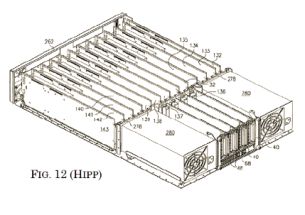On Tuesday, the Federal Circuit vacated the PTAB's final rejection of a claim, finding that the rejection was procedurally improper because the PTAB relied on a basis raised for the first time during the oral argument. That decision highlights the importance of petitioners thoroughly developing all potential invalidity bases in the initial petition.
Specifically, Dell v. Acceleron (Fed. Cir. Mar. 15, 2016) involved a patent for a computer-network appliance containing hot-swappable components. Relevant to the issue of whether Dell disclosed the relevant basis for rejection in the petition, claim 3 recites "wherein the chassis comprises caddies providing air flow from the front to the rear of the chassis." In its petition, Dell argued that articulating door 262 in Fig. 12 of the Hipp reference performs the same function as the caddies in claim 3. Dell's reply after the patent owner response, however, argued that the caddies required by claim 3 are also found in Hipp's power-supply mounting mechanism 278. Acceleron requested a conference call with the PTAB to address invalidity arguments newly addressed in Dell's reply, but the PTAB refused to hold a conference call.

At the oral argument, Dell maintained that Hipp's articulating door 262 and power supply mounting mechanism 278 disclose the "caddies" limitation, but Dell also added a new argument. Dell then argued that Fig. 12 of Hipp shows unlabeled "slides" located below the power supplies 280 and that such slides also constitute caddies. Acceleron disagreed on the merits and again objected on procedural grounds. The PTAB ultimately found that Hipp anticipated claim 3, relying exclusively on Dell's contention that Fig. 12 shows "slides." It concluded that Dell had pointed to that structure in its reply, and therefore rejected Acceleron's argument that the contention was improperly raised for the first time at oral argument.
On appeal, the CAFC found that the "slides" structure was first identified as meeting the "caddies" limitation during the oral argument. The CAFC went on to analyze the requirements the Administrative Procedures Act imposes on the PTO for formal adjudication. The CAFC ultimately vacated the PTAB's ruling, holding that the PTAB denied Acceleron notice and a fair opportunity to respond to the "slides" basis of cancellation. Given its finding that the "slides" basis was first identified at oral argument, the CAFC declined to address under what circumstances a cancellation may rely on a key factual assertion made for the first time in a petitioner's reply.
This holding reiterates the importance of a thorough petition. Petitioners should not take the "kitchen sink" approach of citing to every possible alternative at the expense of developing complete and detailed arguments. Petitioners, however, are well served to rigorously analyze prior art references before the petition and fully disclose all aspects of the prior art that they may need to rely on to prove invalidity.
This article is presented for informational purposes only and is not intended to constitute legal advice.
